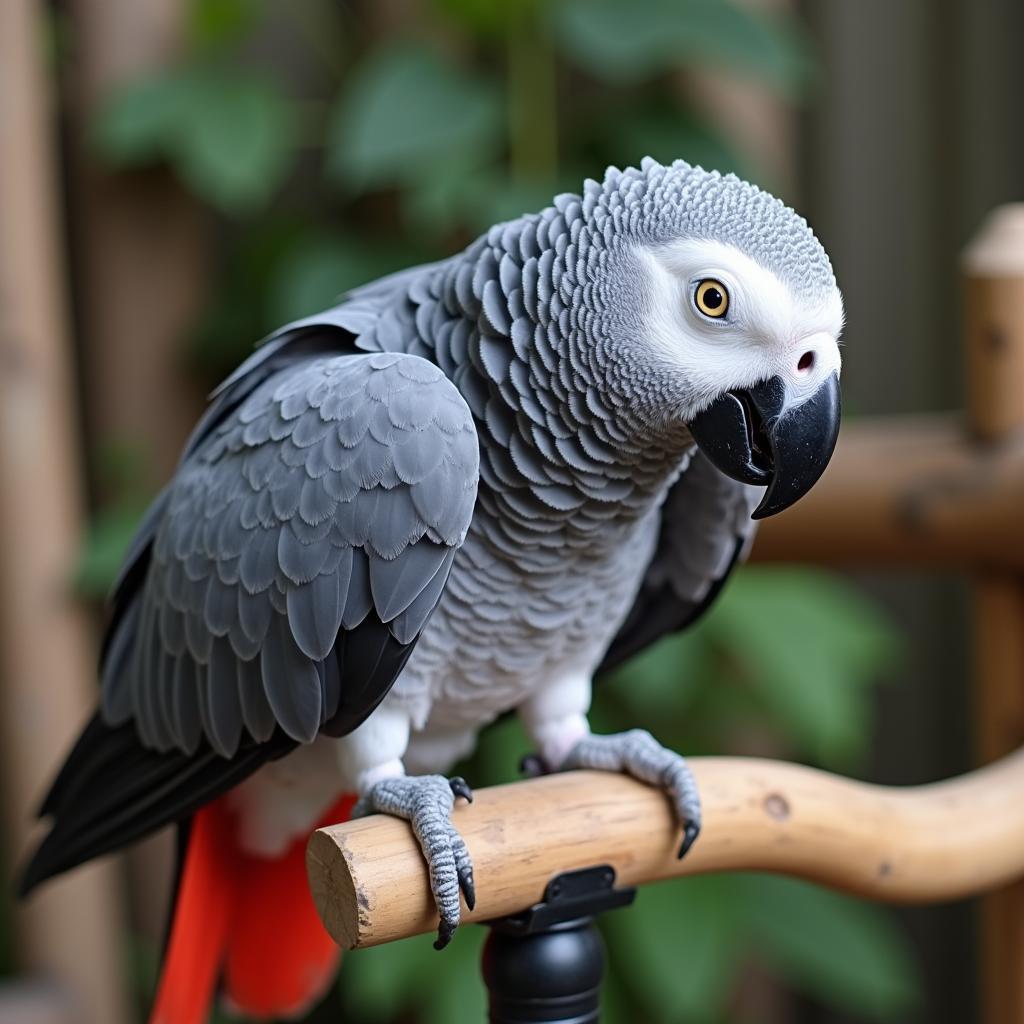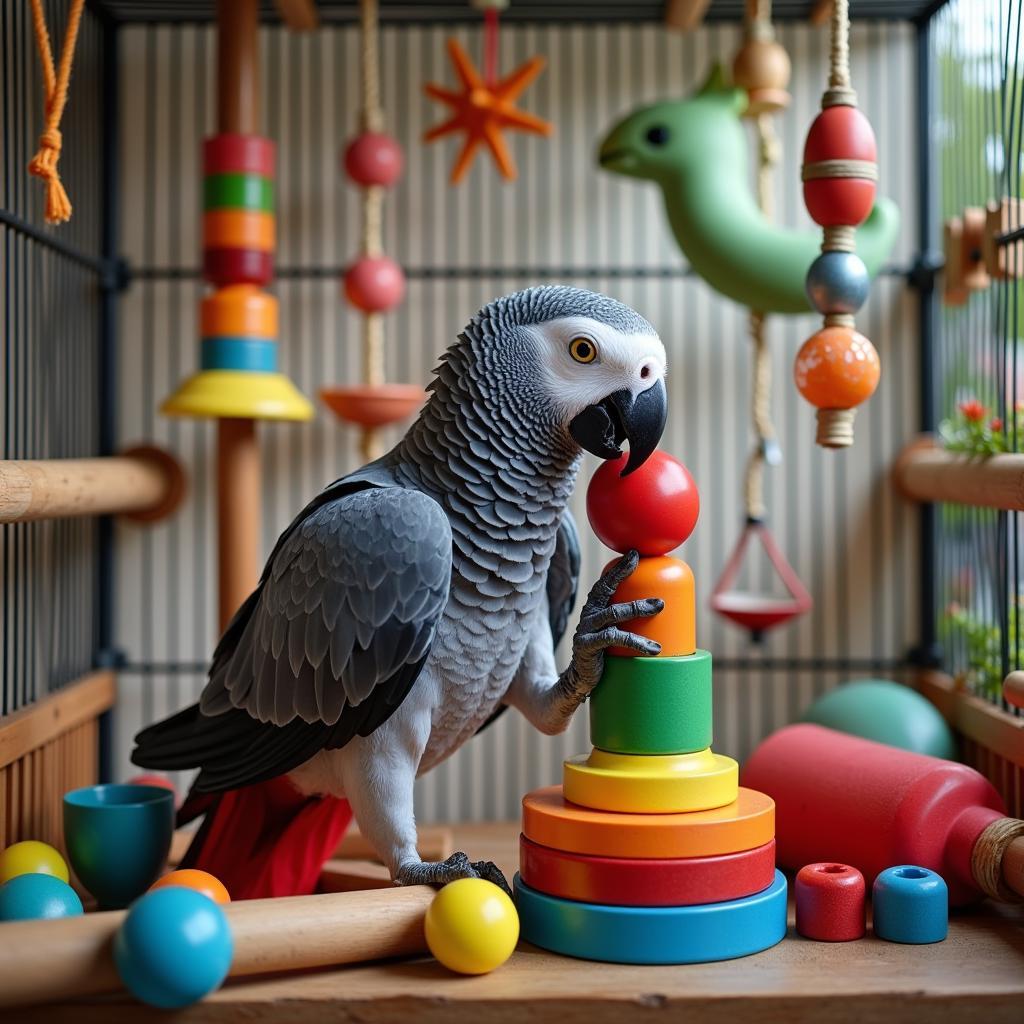Rehoming an African Grey parrot is a significant decision that requires careful consideration and planning. These intelligent and sensitive creatures thrive on routine and companionship, so finding a suitable new home where their needs are met is crucial.
Understanding African Grey Rehoming
African Grey Rehoming involves finding a new, loving home for a parrot that can no longer be cared for by their current owner. This can be due to various factors, such as changes in the owner’s lifestyle, living situation, or simply the realization that they can no longer provide the bird with the time, attention, and care it needs.
 African Grey Parrot Looking Thoughtful
African Grey Parrot Looking Thoughtful
Why African Greys Need Rehoming
There are several reasons why African Greys may need new homes:
- Changes in Lifestyle: Life throws curveballs! Job changes, relocations, or new family members can all impact an owner’s ability to provide adequate care for their parrot.
- Time Commitment: African Greys require significant time and attention. If an owner’s schedule becomes too demanding, the bird may suffer from neglect and loneliness.
- Financial Constraints: Providing proper care for an African Grey, including vet visits, a varied diet, and stimulating toys, can be costly. Financial hardship can, unfortunately, lead to rehoming situations.
- Behavioral Issues: While intelligent, African Greys can develop behavioral problems, especially if not adequately stimulated or socialized. Some owners may feel unequipped to handle these issues.
Finding a Suitable Home: Key Considerations for African Grey Rehoming
When seeking a new home for your African Grey, prioritize the bird’s well-being above all else:
- Experience: Look for potential adopters with prior experience caring for parrots, ideally African Greys. This ensures they understand the commitment involved.
- Environment: A spacious cage in a safe, stimulating environment is essential. The new home should be free of hazards and offer plenty of opportunities for the bird to play and interact.
- Commitment: Rehoming is a long-term decision. Ensure the potential adopter understands the lifespan of an African Grey (up to 60 years!) and is prepared for the long haul.
- Lifestyle Compatibility: The new owner’s lifestyle should align with the needs of an African Grey. They should have ample time for interaction, socialization, and playtime.
 African Grey Parrot Interacting with Toys
African Grey Parrot Interacting with Toys
The Rehoming Process: Steps to Ensure a Smooth Transition
- Thorough Assessment: Evaluate your reasons for rehoming and be honest about your ability to meet your bird’s needs.
- Finding Potential Adopters: Network with avian vets, reputable breeders, and parrot rescue organizations. Online platforms dedicated to African Grey for rehoming can also be helpful.
- Screening and Home Checks: Thoroughly screen potential adopters, asking about their experience, lifestyle, and expectations. Conduct home visits to assess the suitability of their environment.
- Gradual Transition: If possible, arrange for a gradual transition period where the bird can slowly acclimate to its new surroundings and bond with its new owner.
Expert Insights on Ethical Rehoming
“It’s vital to remember that rehoming should always be about the welfare of the parrot,” says Dr. Abena Oti, a renowned avian veterinarian based in Nairobi. “Never rush the process, and always prioritize finding a home that can provide a loving, stimulating environment for these extraordinary creatures.”
FAQs about African Grey Rehoming
Q: How can I find a reputable African Grey rescue organization?
A: Online directories, avian veterinary networks, and recommendations from experienced parrot owners are good starting points.
Q: What should I do if I can no longer care for my African Grey, but can’t find a suitable home?
A: Contact reputable rescue organizations. They often have waiting lists and can offer temporary foster care while a permanent home is found.
Q: What are the signs of a stressed African Grey during rehoming?
A: Feather plucking, changes in appetite, aggression, and excessive vocalization can all indicate stress.
Seeking Further Information
For those looking to explore alternative options, consider researching African Grey for sale by owner or expanding your search to African Grey parrot breeders Australia if geographical distance is not a constraint.
Remember, rehoming an African Grey is a decision that should not be taken lightly. However, by carefully considering the bird’s needs and following a responsible rehoming process, you can ensure your feathered friend finds a loving and supportive forever home. If you need further insights or are looking for engaging content on African Greys, check out these insightful African Grey Youtube videos.
Need Help?
Contact us at:
Phone Number: +255768904061
Email: [email protected]
Or visit us at:
Mbarali DC Mawindi, Kangaga, Tanzania.
Our dedicated customer care team is available 24/7 to assist you.
Leave a Reply